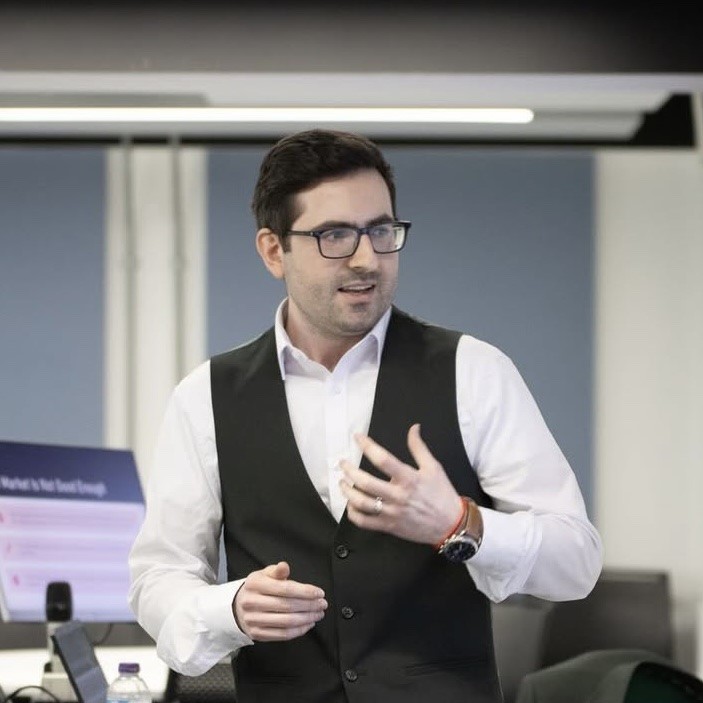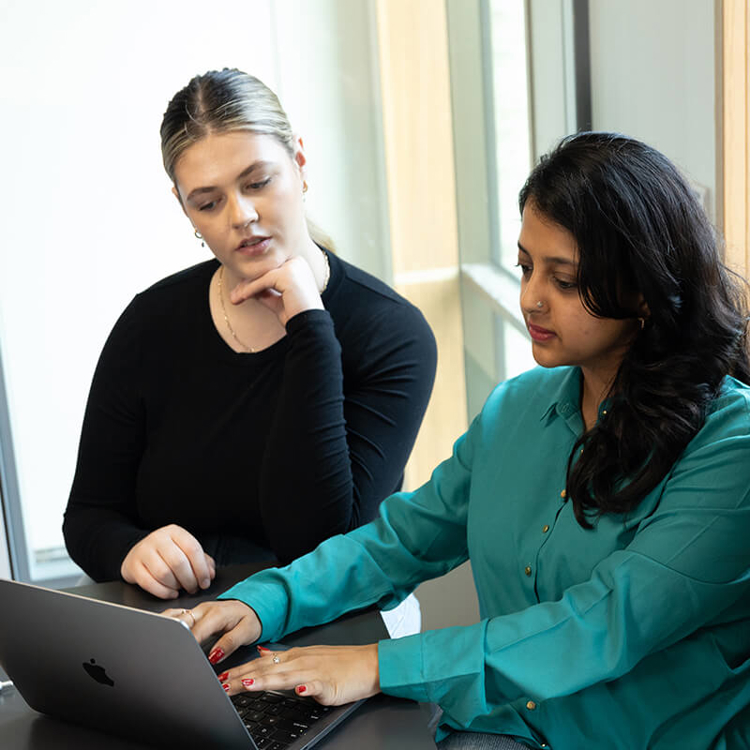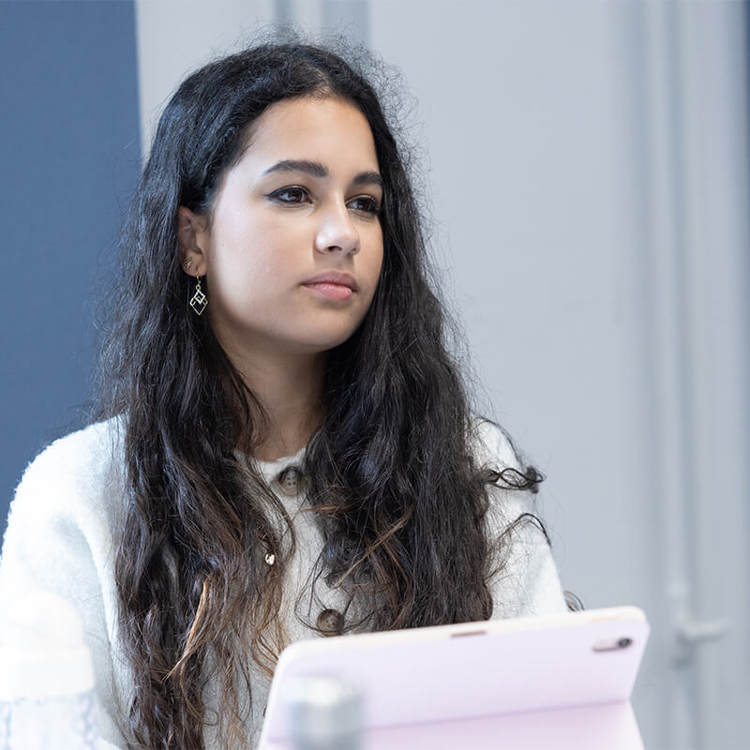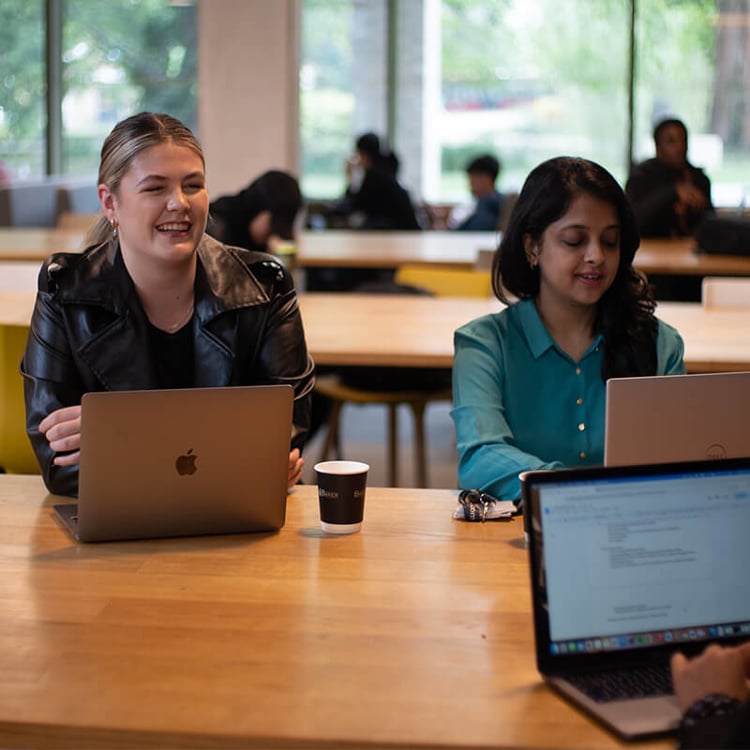Entry tariff:
112–128 UCAS points (or equivalent)
Foundation Year: 64–80 UCAS points (or equivalent)
International Foundation Pathway:
64 UCAS (or equivalent)
IELTS: 5.5
UCAS code:
L110
L120 (If choosing Foundation Year)
Start date(s):
September 2026
Study Economics with impact, insight and individual support.
Our BSc Economics has been ranked 2nd in London and 6th in the UK for student satisfaction in the 2026 Complete University Guide, a reflection of our commitment to teaching, support, and student experience.
You’ll learn from academics whose research shapes the world around us, from finance and technology to sustainability and policy, at a university ranked the UK’s top modern university for research.
At Roehampton, you’ll learn how to make sense of the forces that shape our world, from global markets and climate policy to everyday business decisions. You’ll develop the skills to evaluate evidence, interpret data, and form clear, logical conclusions that help solve real-world challenges.
We focus on applied critical thinking, helping you connect theory to what’s happening in the economy right now. Every module is designed to give you practical experience and confidence to analyse, discuss and act on complex issues in business, policy, and society.
#1 in London for student satisfaction in Economics
National Student Survey 2024

What you'll learn
- Build strong analytical and reasoning skills to evaluate real-world economic and social issues
- Understand how economic decisions influence businesses, governments and individuals
- Gain hands-on experience using professional tools like our Bloomberg Trading Room and enterprise software
- Learn to analyse data confidently and apply evidence-based thinking
- Strengthen communication, teamwork and problem-solving skills through projects and presentations
- You'll visit multinationl firms and key institutions, gaining valuable insight into how economics works in the real world.
Why study economics at Roehampton?
Discover economics with impact
Our BSc Economics takes a fresh, modern approach to understanding how economies function, and how economic thinking can help tackle global challenges, from climate change and digital transformation to financial stability and social justice.
No A-Level Maths? No problem
We believe passion for economics shouldn’t depend on your subject choices at school or college. That’s why our course doesn’t require A-Level Maths. Instead, we’ll support you through tailored quantitative modules in your first year, giving you the confidence and skills you need to succeed.
Research-led teaching from world-class economists
You’ll be taught by academics whose research shapes global debates. They publish in leading journals, advise governments, and contribute to national and international policy. Whether it’s labour markets, finance, sustainability or technology, you’ll explore cutting-edge ideas that make economics come alive.

Small classes, big opportunities
You’ll learn in small, discussion-based classes where your voice matters. Our teaching combines case studies and coaching, helping you link theory to practice and develop confidence in your reasoning and judgement.
Career-ready skills
Employability is built into everything we do. You’ll take on projects that mirror real economic challenges, guided by expert mentors and our dedicated careers team. Through our Work on Wednesday (WoW) programme, you’ll build professional skills, meet employers, and prepare for your future career, gaining the confidence and connections to take your next steps.
Outstanding support
At Roehampton, you’re never on your own. Every student is assigned a personal tutor who supports your academic progress and wellbeing. Our community is known for being friendly, supportive and inclusive, we’ll help you thrive both inside and outside the classroom.

Modules
30 credits
This introductory module provides a systematic and rigorous framework with which to analyse the behaviour of individuals, households, firms, governments and supra-government organisations as economic actors, taking in the context of prevailing social and political factors.
You will be introduced to core economic principles, such as opportunity cost, marginal analysis, rational decision-making, trade-offs, and the role of incentives. It covers the benefits of trade, the efficiency of markets, government intervention when markets fail, the impact of money supply, inflation, and long-term economic growth. These principles serve as the foundation for understanding both microeconomic and macroeconomic concepts throughout the module.
You will explore the fundamental forces that drive market economies, focusing on how consumer demand and producer supply interact to determine prices and understand how markets operate through price signals, in particular, price elasticity, income elasticity, and cross-price elasticity.
You will examine the causes and consequences of inflation, including demand-pull and cost-push inflation, and how it is measured using price indices such as the Consumer Price Index (CPI). The effects of inflation on purchasing power, interest rates, wages, and economic stability will be analysed. Policies to control inflation, including monetary policy, will also be discussed.
Teaching and learning
You will be taught through lectures and workshops that are underpinned by case-based learning. You will also have access to online support and employability-related activities.
Lectures will cover core material, while workshops will engage you in solving practical exercises aimed at supporting and consolidating your learning.
Assessment
This module will be assessed by an online test (30%) and an essay (70%).
30 credits
You will develop your talent, skills and competencies through focused business readiness activities and live global multicultural challenges. We apply industry specific knowledge; use practical case examples; live case studies and issues to draw out the skills and professional attitudes valued by employers; theoretical models and concepts to enable you to gain an understanding of industry requirements helping you transition into employment or entrepreneurship. We use a coaching approach to teaching to build confidence, critical thinking and embed learning into practice.
The module also allows for skill development, competencies in written academic, verbal and technological enquiry/research activities to help you progress through your chosen degree of study. It lays the foundation for further competency development needed to progress through each year which will be built on by other modules. You will engage in learning activities which develop your inclusive leadership skills and competencies in working in global and multi-cultural settings.
You will learn how to transform yourself professionally, enhance your career trajectories, and excel in your chosen fields while navigating the challenges of technological advancements, ethical and sustainability dilemmas, and the evolving demands of the modern workplace.
Topics covered include:
- Developing business sector awareness in team situations and meeting industry challenges
- Inclusive leadership and sustainability practices
- Your future careers, talent management, recruitment and selection, reflective practice, academic skills and technology working
Teaching and learning
You will be taught through lectures and workshops that involve a range of learning and teaching approaches, which includes online support and employability-related activities.
Lectures will be developed around the key concepts, models and frameworks around employability and the world of work, technology and competency development, talent acquisition, careers development and enterprise development.
Seminars will concentrate particularly on the elaboration of specific theoretical approaches with reference to their possible application through the selection of case examples, live business challenges, simulated recruitment and selection activities.
Assessment
This module will be assessed by a professional pitch and personal brand portfolio (50%) and a reflective report (50%).
30 credits
You will be introduced to key concepts and issues relating to business organisations in global environments.
You will focus on globalisation and the different types and objectives of business organisations. You will then cover a range of topics related to assessing the environments within which businesses operate such as economic growth, international trade and global industries. The link between business organisations and environments is further examined within the context of analytical frameworks such as PESTLE, Porter's 5 Forces and Demand/Supply analysis.
Teaching and learning
You will be taught through lectures and workshops that involve a range of learning and teaching approaches, which includes online support and employability-related activities.
Lectures will cover core business environment concepts and analytical frameworks, while workshops will engage you in solving practical global business challenges and strategic decision scenarios.
Workshops will consist of a blend of interactive global business simulations, group work on international market analysis and strategic decision-making exercises, and debates on contemporary global economic issues designed to support analytical and cross-cultural communication skills development.
Assessment
This module will be assessed by a reflective journal (30%) and coursework (70%).
30 credits
This module covers topics of mathematics and statistics, where you will become familiar with data analysis.
You will learn to apply quantitative methods to evaluate real-world issues related to equity and diversity. For instance, you will learn how statistical analysis can uncover disparities. Focusing on data interpretation and optimisation, you'll learn about the tools and techniques that can be used to evaluate efficient resource allocation and sustainable (optimal) investment strategies.
You will gain experience of working with applications such as Excel and Stata.
Teaching and learning
You will be taught through lectures and workshops that are underpinned by case-based learning. You will also have access to online support and employability-related activities.
Lectures will cover core material, while workshops will engage you in solving practical exercises aimed at supporting and consolidating your learning.
Assessment
This module will be assessed by a multiple-choice test (70%) and coursework (30%).
These are the current planned modules on this course and may be subject to change.
30 credits
This module extends and develops understanding of the standard approach to decisions based on optimisation: utility maximisation amongst individuals and profit maximisation among firms. The module shows how this approach can be embedded in formal models of equilibrium exploring a variety of competitive situations, including strategic interactions among businesses and intertemporal choice.
Moreover, building on the foundations of standard (neoclassical) economics, you will learn to apply behavioural economics concepts and findings to predict economic actors' seemingly irrational behaviour.
Teaching and learning
You will be taught through lectures and workshops that involve a range of learning and teaching approaches, which includes online support and employability-related activities.
Lectures will cover core material, and in workshops you will engage in solving practical exercises aimed at supporting and consolidating your learning.
You will utilise software and tools that enable you to apply your knowledge in cases/policies-based study. You will acquire experience working with applications such as Excel and AI-enhanced tools to simulate market and strategic interactions.
Assessment
This module will be assessed by online multiple-choice and short questions test (30%) and open-book assignment (70%).
30 credits
You will gain insights from economic theory which is relevant to applications in managerial decision making. The module bridges the gap between economic theory and the day-to-day decision-making process of managers. The emphasis is on applying microeconomics concepts to solve problems, so to understand how business executives and other policy makers should take decisions.
The module material explains how EDI concepts, such as fair distribution of resources and income inequality impact business decisions. It also analyses diverse market segments and how consumer preferences can vary across different demographic groups, emphasising the importance of understanding these differences in management decisions.
You will be exposed to global examples to illustrate how economic policies, market structures, and managerial decisions differ across countries and cultures. The module also discusses how businesses must adapt their strategies in different cultural contexts.
You will look at practical projects, case studies, and simulations that mimic real-world business challenges. These will develop your critical thinking, problem-solving, and communication skills, which are essential for career success in managerial roles.
Teaching and learning
You will be taught through lectures and workshops that involve a range of learning and teaching approaches, which includes online support and employability-related activities.
Lectures will cover core material, and in workshops you will engage in solving practical exercises aimed at supporting and consolidating your learning.
You will use analytical software (i.e., Excel and Stata) and tools that are prevalent in business decision-making, to enhance your analytical skills. You will experiment win simulation games that will allow you to experiment with economic models and decision-making in a virtual environment.
Assessment
This module will be assessed by an online submission of data analysis supported by AI (30%) and an assignment based on a case study (70%).
30 credits
You will gain insights on the determination of macroeconomic variables and the effects of policy decisions. The module looks at these features of the economy distinguishing between short, medium, and long run. You will expand your understanding of general macroeconomic dynamics by also looking at the functioning of international trade and how globalisation affects the impact of macroeconomic policies.
The module looks at diverse perspectives in economic theories, focusing on case studies from various cultures, and contributions from economists of different backgrounds. It also highlights how macroeconomic policies affect various demographics differently.
You will look at concepts like sustainable growth, green economics, and the role of government and markets in promoting environmental sustainability. Alongside exploring the macroeconomic policies' impacts on ecological sustainability, such as carbon taxation, renewable energy investment, and regulatory frameworks.
You will look at practical projects, case studies, and simulations that mimic professional economic analysis and decision-making processes. These will develop skills that are valuable in the job market, such as data analysis, data manipulation, and policy evaluation.
Teaching and learning
You will be taught through lectures and workshops that involve a range of learning and teaching approaches, which includes online support and employability-related activities.
Lectures will cover core material, and in workshops you will engage in solving practical exercises aimed at supporting and consolidating your learning.
You will use technology for simulations, data analysis, and visualisation of economic data to gain a hands-on learning experience. You will enhance your data literacy skills by incorporating training on using economic databases, statistical software and programming tools relevant to macroeconomic analysis.
Assessment
This module will be assessed by an online submission case based on macroeconomics data analysis and reporting (30%) and an assignment based on four mini essay questions (70%).
30 credits
This module looks at the statistical tools needed to understand empirical economic research and to evaluate public policy interventions or market competition. Additionally, it aims to equip you with digital data-driven skills to plan and execute independent quantitative projects.
The module material explains how EDI concepts, such as fair distribution of resources and income inequality impact business decisions. It also analyses diverse market segments and how consumer preferences can vary across different demographic groups, emphasising the importance of understanding these differences in management decisions.
You will be exposed to global examples to illustrate how economic policies, market structures, and managerial decisions differ across countries and cultures.
The module activities incorporate simulations, role-playing, and project-based learning that mimic real-world business challenges. These activities focus on developing your critical thinking, problem-solving, and communication skills which are essential for career success in managerial roles.
Teaching and learning
You will be taught through lectures and workshops that involve a range of learning and teaching approaches, which includes online support and employability-related activities.
Lectures will cover core material, and in workshops you will engage in solving practical exercises aimed at supporting and consolidating your learning.
You will use analytical software (i.e., Excel and Stata) and tools that are prevalent in business decision-making, enhancing your analytical skills. Course activities also implement simulation games that allow you to experiment with economic models and decision-making in a virtual environment.
Assessment
This module will be assessed by practical econometrics work in Excel/SPSS assignment (50%) and a group presentation (50%).
These are the current planned modules on this course and may be subject to change.
This course offers all students the option of a one-year paid work placement, to boost your employability even further. If you choose this route, you will take the placement following year two of your course, and then return to complete your degree.
Why take a placement?
A placement year is the perfect opportunity to gain valuable work experience, to build on the career skills we will teach you on this degree. The connections you make on the placement will improve your career prospects further, and equip you with the skills you need to secure graduate-level employment.
How we support you
The University's Placement and Work Experience Team are experts at helping you to secure a placement. They will work closely with you from the start, helping you research potential employers, discover placement opportunities, create and pitch your CV, and will coach you to perform well in interviews. We aren't able to guarantee a placement, but our sector-leading advisors will give you the best possible chance of securing one.
Find out more about how we'll support you
We understand that your plans might change once you start your programme. If you decide not to do a placement, you will have the option of completing the three year version of your programme.
Whatever your choice, you will have access to many opportunities for work experience through our Placement and Work Experience Team, and access to face-to-face and 24/7 online careers support.
30 credits
This module develops essential quantitative skills, financial theory, product knowledge, and cognitive ability for the capital markets investment industry. It covers market characteristics, asset classes, portfolio theory, fixed income, equities, selected derivatives, and relevant quantitative techniques.
It also distinguishes personal wealth management from institutional fund management to enhance employability. This module covers both institutional fund management and personal wealth management, enhancing financial literacy and making investment decision-making accessible.
You will develop financial data literacy and basic quantitative skills through an investment advisory project, improving your employability.
Teaching and learning
You will be taught through lectures and workshops that involve a range of learning and teaching approaches, which includes online support and employability-related activities.
Lectures will cover core material, and in workshops you will engage in solving practical exercises aimed at supporting and consolidating your learning. A compulsory component, a Bloomberg certificate programme, will make you familiar with industry-standard financial information services.
Teaching is supported by quantitative spreadsheet modelling and financial software, immersing you in a technology-driven environment that reflects real-world industry practices.
Assessment
This module will be assessed by a practical industry-led certificate (50%) and a group assignment (50%).
30 credits
This module applies economic analysis to current trends and key challenges in the global economy.
The topics covered include economic growth and inequality across nations, climate change, demography, health, labour, artificial intelligence, institutions and development, and the macroeconomic conditions that have emerged in the aftermath of the great recession and the COVID-19 pandemic.
By studying this module, you will gain a fundamental understanding of the factual context surrounding today's challenges and how economics can be used to both illuminate major global problems and aid in designing effective policies. Additionally, you will benefit from opportunities for group work, which will enhance your collaborative and discussion skills.
You will examine economic inequalities, labour market disparities, and institutional responses to demographic shifts. Through case studies, you will assess how policies shape opportunities and explore solutions for fostering more inclusive economic systems.
You will explore the economic impact of climate change, biodiversity loss, and environmental policies, emphasising sustainable growth strategies. You will analyse policies such as carbon taxation and green innovation, gaining insights into balancing economic development with environmental responsibility.
Teaching and learning
You will be taught through lectures and workshops that involve a range of learning and teaching approaches, which includes online support and employability-related activities.
Lectures will cover core material, and in workshops you will engage in solving practical exercises aimed at supporting and consolidating your learning.
You will be equipped with practical skills for careers in economics, policy, and finance. Through data analysis, case studies, and group projects, you will apply economic theories to real-world challenges, enhancing your analytical and problem-solving abilities.
By integrating digital tools, economic simulations, and AI-driven analysis, the module will enhance your ability to engage with complex economic data. It also explores the impact of automation and AI on labor markets and education, preparing you for a tech-driven economy.
Assessment
This module will be assessed by a group presentation (30%) and an essay (70%).
30 credits
This intensive six-week taught module is designed to equip you with the essential competencies needed for professional consultancy practice.
This module serves as the skills-based foundation for the concurrent Roehampton Live Project, providing you with theoretical frameworks, practical tools, and professional capabilities required to deliver high-quality consultancy services to real clients.
Delivered as a professional bootcamp in a blocked format, this module creates an immersive learning environment where you will develop expertise in consultancy methodologies, client relationship management, strategic problem-solving, and professional communication. The intensive structure enables you to build confidence and competence before engaging with live client projects.
You will learn to integrate ethical considerations, social responsibility, and environmental sustainability into your consultancy approach, ensuring that your professional practice contributes to broader societal wellbeing.
Key areas of focus include consultancy frameworks and methodologies, client engagement and relationship management, evidence-based research and analysis techniques, strategic thinking and recommendation development, professional communication and presentation skills, and ethical consultancy practice and sustainability integration.
You will engage in real case studies and simulated client scenarios, working individually and in teams to apply learned concepts. The module incorporates guest speakers from industry, practical workshops, and reflective exercises to bridge theory and practice effectively.
This module prepares you for immediate application of skills in your concurrent Live Project module, where you will work with real clients as part of the ‘Roehampton Business Advice Centre’.
Teaching and learning
The module employs intensive blocked delivery with high contact hours to create an immersive professional development experience. Teaching methods include interactive workshops, case study analysis, simulation exercises, guest speaker sessions, and peer learning activities.
You will have 22 hours of lectures and 33 hours of workshops over six weeks. Lectures and workshops will be interactive in nature providing an environment for sharing business ideas, problem space mapping and evaluation opportunities and carrying business scoping exercise.
Assessment
This module will be assessed through consultancy toolkit portfolio coursework (50%) and a consultancy bid presentation (50%).
30 credits
This transformative capstone module is designed to bridge the gap between academic study and professional practice. You will have the opportunity to apply your academic knowledge in a real-world setting, developing strategic solutions to real-world business challenges.
You will work in consultancy teams as part of the Roehampton Business Advice Service, collaborating with a diverse range of external clients, including small and medium enterprises (SMEs), non-profit organisations, social enterprises, and larger companies. Global engagement projects will also be sought with partners outside of the UK, or projects that can have an influence on communities globally.
Each team will engage with a client to diagnose business problems, conduct in-depth research, and formulate evidence-based recommendations. By making an impact through real-world projects, you will enhance your ability to navigate complexity, synthesise information, and communicate your insights effectively to senior stakeholders.
While teamwork is a core aspect of this module, you will also undertake substantial individual work, ensuring that your personal contributions are critically assessed and aligned with your professional aspirations. The module is structured to simulate a professional consultancy environment, equipping you with the practical skills, commercial awareness, and adaptability needed for leadership roles in business and beyond.
You will be encouraged to develop ethical, socially responsible, and sustainable business solutions, ensuring that your recommendations contribute not only to organisational success but also to broader societal and environmental wellbeing.
Through a combination of practical experience, academic rigor, and reflective work-based learning, you will be empowered to become a strategic thinker, problem solver, and an influential professional. The module is designed to be a stepping stone into a range of career paths, with projects aligned with your own career goals. By the end of this module, you will have built a portfolio of high-quality work that demonstrates your analytical, decision-making, and communication skills.
Teaching and learning
Each consultancy team will be assigned an academic supervisor who will provide structured guidance, feedback, and oversight throughout the project.
You will have scheduled supervision meetings, including meetings with your supervisor at key milestones during the project to discuss progress, challenges, and next steps. Supervisors will support you in managing client relationships and ensure professionalism in communications.
Assessment
This module will be assessed by a consultancy report (50%) and a live presentation (50%).
These are the current planned modules on this course and may be subject to change.
This course offers a foundation year, which takes place at the beginning of your studies. Studying a foundation year will give you academic and practical experience, and a strong introduction to your subject, ensuring you succeed on your undergraduate degree.
30 credits
You will develop your core academic and integrated English language skills of speaking, listening, reading and writing. You will become familiar with key academic skills and concepts, such as referencing methods and awareness of academic integrity and tone. You will apply these skills and knowledge to both broad topics and also your chosen subject pathway.
Teaching and learning
You will be required to actively engage in on-campus learning for up to 10 hours a week.
You will be taught through a full range of teaching and learning methods, which include lectures, seminars, workshops, discussion groups, group directed tasks and presentations. This will enable you to learn from your peers and tutors in both structured and information settings.
You will be encouraged to think creatively about your approach to learning and discussions with your peers. You will also have access to recordings, resources, links and signposting through Moodle to enrich your learning.
Assessment
You will be assessed through group and individual presentations, comparative and reflective essays, multiple choice exams, coursework and reports, oral exams, portfolios, case studies and blogs.
30 credits
You will develop your core academic and integrated English language skills of speaking, listening, reading and writing. You will become familiar with key academic skills and concepts, such as referencing methods and awareness of academic integrity and tone. You will apply these skills and knowledge to both broad topics and also your chosen subject pathway.
Teaching and Learning
You will be required to actively engage in on-campus learning for up to 10 hours a week.
You will be taught through a full range of teaching and learning methods, which include lectures, seminars, workshops, discussion groups, group directed tasks and presentations. This will enable you to learn from your peers and tutors in both structured and information settings.
You will be encouraged to think creatively about your approach to learning and discussions with your peers. You will also have access to recordings, resources, links and signposting through Moodle to enrich your learning.
Assessment
You will be assessed through group and individual presentations, comparative and reflective essays, multiple choice exams, coursework and reports, oral exams, portfolios, case studies and blogs.
30 credits
You will develop your research, numeracy and information technology skills. You will investigate the difference between primary and secondary research, conduct your own research project and demonstrate your findings through data analysis. You will also develop your awareness of equality, diversion and inclusion in the UK, through a real-world issue; discrimination in the workplace.
Teaching and learning
You will be required to actively engage in on-campus learning for up to 10 hours a week.
You will be taught through a full range of teaching and learning methods, which include lectures, seminars, workshops, discussion groups, group directed tasks and presentations. This will enable you to learn from your peers and tutors in both structured and information settings.
You will be encouraged to think creatively about your approach to learning and discussions with your peers. You will also have access to recordings, resources, links and signposting through Moodle to enrich your learning.
Assessment
You will be assessed through group and individual presentations, comparative and reflective essays, multiple choice exams, coursework and reports, oral exams, portfolios, case studies and blogs.
30 credits
This module provides you with a foundational understanding of the principles and practices of business. You will explore the fundamental concepts of business environments, legal structures, and organisational dynamics, focusing on small and large businesses.
With the introduction of key principles of sustainability, social responsibility, and inclusive business practices in a globalised economy, it is expected that you will develop an understanding of contemporary issues affecting businesses at both local and global levels. The transferable skills you will develop in taking this module will enable you to critically evaluate new business ventures, create mission and vision statements, and engage in collaborative activities to develop essential teamwork and communication skills.
The module follows a thoughtful combination of theory, applied learning and reflective practices. By emphasising real-world applications, ethical considerations and global awareness, you will become a responsible, skilled and adaptive business professional.
Teaching and learning
Through interactive workshops, role-play activities, and case studies, it is expected that you will develop practical skills in business planning, stakeholder analysis, and strategic thinking.
The teaching delivery for each module consists of one, one-three-hour lecture and one, two-hour seminar per week. Seminars will consist of individual, group activities and role plays.
You will also have an additional 30 minutes of online support each week, which will consist of individual tasks such as quizzes, posting on discussion forums, watching videos and taking notes and reading.
Assessment
This module will be assessed using a business pitch and an individual written report.
40% - formative assessment where you will identify sources of business ideas (300 words) and summative assessment, where you will be required to present a business pitch to an audience of investors.
60% - individual written report, using a start-up company of your choice to identify and evaluate key challenges faced.
30 credits
This module delves deeper into core business functional areas and includes topics such as: marketing, finance, Human Resource Management (HRM) and leadership. The module is structured to enable you to gain an understanding of analytical frameworks such as SWOT, PESTLE and Porter’s Five Forces that will enable you to evaluate as well as identify opportunities and challenges within different business environments. The transferable skills you will develop in taking this module will enable you to critically evaluate the key functional aspects of business operations and application of theory to practice.
You will also evaluate the principles of product life cycle, and business portfolio management. This exploration will further develop your foundational skills that will enable you to deal with real-world business challenges and engage in critical discussions. Additionally, the module design follows a thoughtful combination of theory, applied learning and reflective practices, emphasising real-world applications, ethical considerations and global awareness, preparing you to become a responsible, skilled and adaptive business professional.
Teaching and learning
This module will be delivered to ensure active interactions through workshops and seminar activities while focusing on practical applications, such as cost behavior, breakeven analysis, market research, recruitment processes, and globalisation.
The teaching delivery for each module consists of one, one-three-hour lecture and one, two-hour seminar per week. Seminars will consist of individual, group activities and role plays.
You will also have an additional 30 minutes of asynchronous digital support each week, which will consist of individual tasks such as quizzes, posting on discussion forums, watching videos and taking notes and reading.
Assessment
This module will be assessed using a group presentation and an individual written report.
40% - group presentation, where you will use relevant tools to evaluate the macro environment of a business organisation of your choice.
60% - individual written report, acting like an independent management consultant, you will write an analytical business report on a company of your choice on how it can gain or increase its competitive advantage.
These are the current planned modules on this course and may be subject to change.
Careers
You’ll graduate with a set of highly marketable skills that will help you meet the many challenges in today’s rapidly changing digital world.
Our BSc Economics degree, will open doors across industries. You’ll graduate with the analytical, problem-solving and communication skills employers look for and the ability to apply economic thinking to real issues.
Our graduates pursue careers in
- Financial services and banking
- Economic and policy analysis
- Market research and data analytics
- Government, charities and international organisations
You’ll also have the perfect foundation for postgraduate study or professional qualifications in economics and finance.

The Student Futures team is here to support you throughout your time at Roehampton and beyond.
They offer services tailored to your needs, helping you take confident steps towards your future.
You’ll have access to a wide range of career workshops and events, where you can engage with employers and develop the skills you need to succeed in the workplace.
These opportunities will help you build your CV, prepare for interviews, and connect with successful Roehampton graduates who are thriving in their careers. You’ll also be able to engage with our partners across London and beyond.
Wherever you want to go in the future, you'll be preparing for the world of work from your very first day.
Continue your studies at Roehampton
Once you've graduated, you could study one of our specialist postgraduate courses:
Learning and assessment
The programme combines traditional quantitative economics training with case-based and experiential learning.
These are implemented by a coaching approach so to cultivate critical thinking, collaboration, and professional skills.
In each module, you will learn technical quantitative skills that are then applied in real-world cases, live projects, and reflective practices.
You will have plenty of opportunities to test your knowledge by analysing and solving realistic, real-world scenarios that reflect contemporary challenges faced by managers, business and policy makers. These cases are often based on real events, encouraging you to apply theoretical concepts to practical situations.
You will engage with live projects, simulated policy implementations, and applied research activities.
In your final year, you can undertake a capstone project, where you can choose from a range of pathways from research to sustainability-focused interventions. If you’re interested in more extensive industry immersion, our optional Professional Experience Year will give you valuable opportunities to apply your learning to real-world settings, as well as developing your employability skills, and building your industry connections.
We will empower you to take ownership of your learning journey and develop the mindset to be a lifelong learner. We will facilitate your learning through reflective questioning, structured, personalised feedback, and mentoring that will enhance your personal growth and academic independence.
You’ll gain key skills in resilience, adaptability and professional self-awareness and put yourself in a confidence place for future study or employment.
Teaching integrates lectures, solving abstract problem sets and engaging in practical workshops and case studies. These activities take place in state-of-the-art facilities, including our Bloomberg Trading Room, and make use of relevant software packages like Stata and SPSS.
This blend will give you critical, active and applied learning, so you’re ready for the professional environment in economics and finance.
How you'll be assessed
Once you know, you need to be able to do!
Assessment has multiple forms and is designed to help you develop the knowledge, skills, and confidence you will need in the workplace.
You will be assessed through a wide variety of ways, including:
- Data analysis
- Critical use of Artificial Intelligence
- Theoretical problem sets
- Posters & presentations
- Financial portfolios creation and management
- Economic consultancy projects
- Reflective reports on policy decisions
Opportunities & facilities
At Roehampton, you will become part of a values-led, globally conscious academic community where innovation, sustainability, and inclusive leadership are central to how we teach, learn and build the future.

Bloomberg Trading Room
You'll have access to the same powerful tools that professionals use to analyse real-time finance and economics data, stay ahead of the curve with the latest insights, and build the skills that will set you apart in the competitive finance industry.

Roehampton Business Laboratory
Our enterprise incubator will support you in developing and scaling entrepreneurial ideas. It also houses signature initiatives like the RISE Prize and the Dragon's Den Style Launchpad showcase.
Celebrating innovation at the LaunchPad start-up awards 2025

World-class library
Home to hundreds of thousands of books, over 1,000 seats, and modern, collaborative and silent study spaces. You'll also have access to a vast range of online resources, like e-books, journals, and databases whenever you want.
Open days
Get a real taste of our campus, community and what it’s like to study at Roehampton
Applying
Full-time UK undergraduate students apply through UCAS.
Entry tariff
112–128 UCAS points (or equivalent)
Foundation Year: 64–80 UCAS points (or equivalent)
Looking to work out your UCAS points or find out about our entry requirements? Find out more.
When we consider applications to study with us, we form a complete view of your achievements to date, and future potential, and can offer flexibility in entry requirements. Find out more about our Contextual Offer scheme.
General entry requirements
International undergraduate students apply through our direct application system.
Entry tariff
112–128 UCAS points (or equivalent)
International Foundation Pathway:
64 UCAS (or equivalent)
IELTS: 5.5
Looking to work out your UCAS points or find out about our entry requirements? Find out more.
When we consider applications to study with us, we form a complete view of your achievements to date, and future potential, and can offer flexibility in entry requirements. Find out more about our Contextual Offer scheme.
General entry requirements
Fees and funding
UK students
Tuition fees
| Entry date | Undergraduate Year 1 | Undergraduate Foundation Year |
|---|---|---|
| September 2026 | £9,790 | £5,914 |
Prices shown are for the first year of your degree.
Funding your studies
We also provide other ways to support the cost of living, including on-campus car parking, hardship support and some of the most affordable student accommodation and catering in London.
International students
Tuition fees
| Entry date | Undergraduate Year 1 | Undergraduate Foundation Year | International Foundation Pathway | International Year 1 in Business |
|---|---|---|---|---|
| September 2026 | £17,628 | £17,628 | £17,628 | £17,628 |
| January 2027 | – | – | £17,628 | £17,628 |
Prices shown are for the first year of your degree.
Funding your studies
We also provide other ways to support the cost of living, including on-campus car parking, hardship support and some of the most affordable student accommodation and catering in London.






